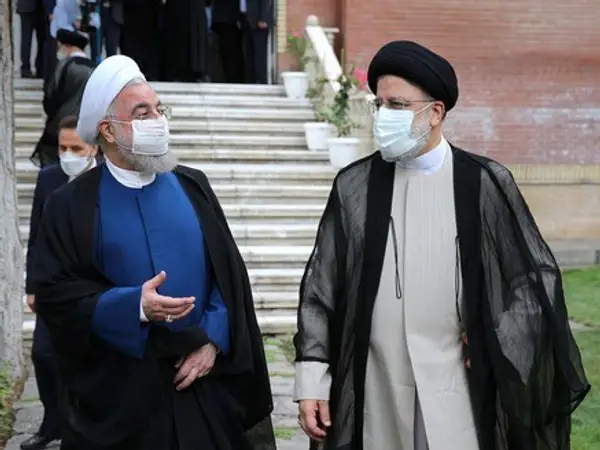Iranian president Ebrahim Raisi has tried to defend his dismal economic performance by blaming his predecessor, but that tactic seems to have run its course.
Former President Hassan Rouhani and his aides are increasingly challenging Raisi’s claims that he inherited an empty treasury with no foreign currency reserves and a mountain of unpaid bills.
In a speech to former government officials and aides in his office in Tehran July 18, Rouhani claimed that there were billions of US dollars in cash in the Central Bank of Iran when his is administration handed over the treasury to the new administration in August last year.
It should be noted that Iran had already increased its oil exports from the end of 2020, after the incoming Biden administration signaled its intention to return to the 2015 nuclear agreement, the JCPOA, which would mean lifting sanctions imposed by President Donald Trump in 2018. Therefore, the Rouhani administration had about 8 months of higher oil sales when it handed over the treasury.
Economy minister Ehsan Khandouzi finally admitted to reporters on July 20 that the country had a “good cash reserve” of foreign currency when the current administration took over but also claimed that the cash reserves were earmarked for “paying for services” and could not be used for importing goods and “solving the country’s’ trade problems”.
The economy minister’s admission contradicted claims by various government officials during the past year that the Rouhani administration had handed over an empty treasury.
Two months before handing over the government, former vice president Es’haq Jahangiri, had told reporters that the incoming administration would be in possession of the “most unprecedented foreign currency and gold reserves”.
Officials of the Raisi administration claim that his government has not resorted to printing money and has even succeed in reducing the monetary base by 0.5 percent in the three-month period ending June 21 in comparison with the same period the previous year.
Monetary base (MO) is the total amount of a currency that is either in general circulation in the hands of the public or in the form of commercial bank deposits held in the central bank's reserves.
In a tweet Thursday, the former governor of the Central Bank of Iran (CBI), Abdolnaser Hemmati, responded that the Raisi administration’s repeated assertions of not having borrowed money from the CBI to offset its budget deficit were not true as the administration had withdrawn from the accounts of government-owned companies to make payments.
“Tweaking statistics doesn't solve problems and [their effects] come to light within a few months. The outcome of the government’s financial and monetary policies should reveal itself in people’s lives,” he wrote.
In the same speech Rouhani claimed that his administration could have removed US sanctions in 2021 had the hardline parliament not passed the ‘Strategic Action to Eliminate Sanctions and Defend Iranian Nation's Interests’ bill on December 1, 2020, which prevented his government from concluding an agreement with world powers to restore the 2015 nuclear deal known as the Joint Comprehensive Plan of Action (JCPOA).
The Raisi administration has so far failed to restore the deal and lift the US sanctions which considerably affect the country’s crude oil exports and squeeze the government for foreign currency. US Secretary of State Antony Blinken recently said the Biden administration would keep using its authorities to target Iran's exports of energy products.
